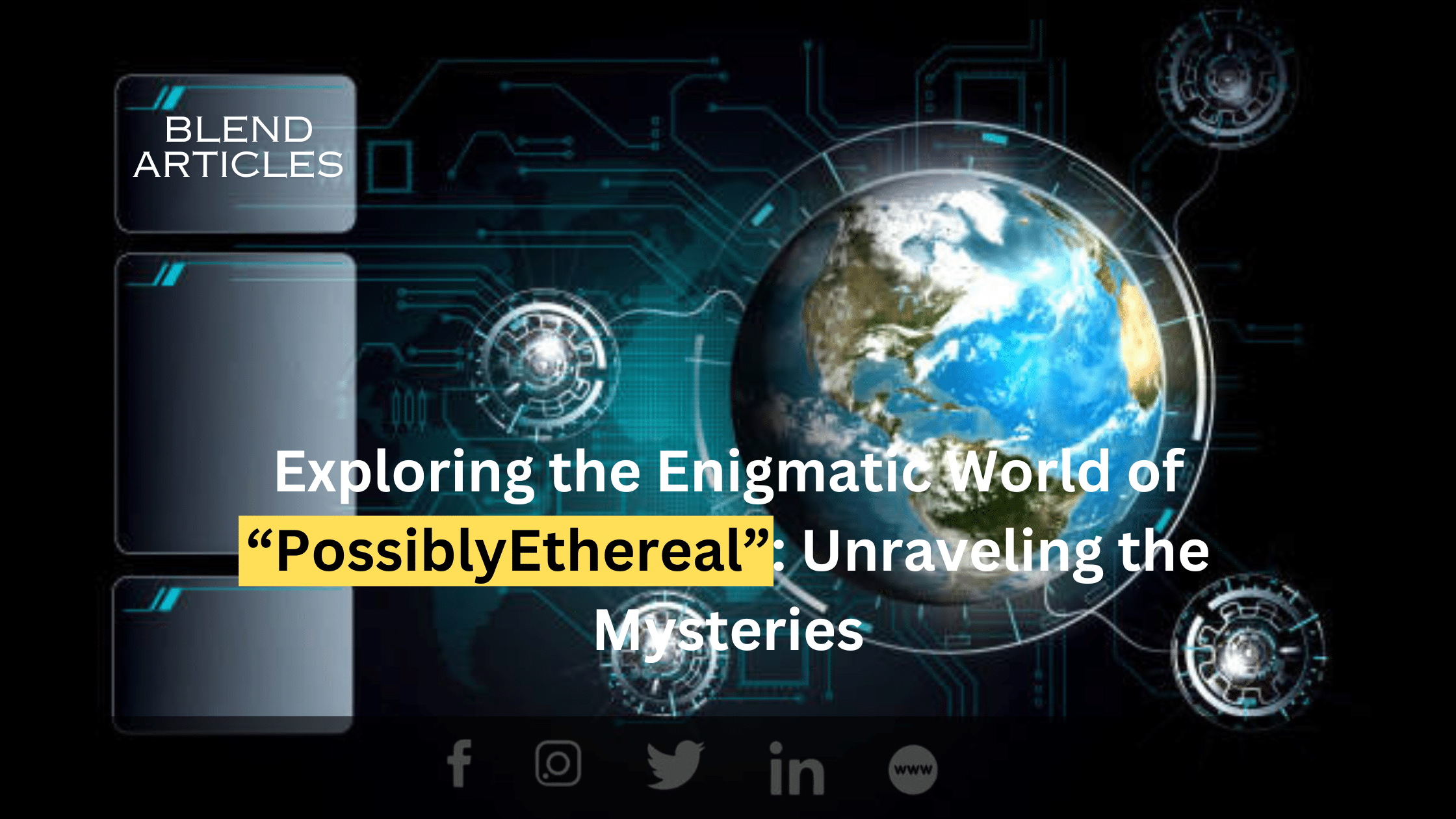Exploring the Enigmatic World of “PossiblyEthereal”:Unraveling the Mysteries

Table of Contents
Introduction:
The term “possiblyethereal” defies easy definition, residing in the realm of ambiguity and transcendence. It encompasses elements that blur the line between the real and the imagined, inviting readers to explore worlds beyond the confines of logic and reason. In this article, we embark on a journey to unravel the mysteries of the possibly ethereal in literature, delving into classic works and contemporary expressions that embody its essence.
Defining the PossiblyEthereal
At its core, the possibly ethereal challenges our perceptions of reality, inviting us to embrace uncertainty and ambiguity. Unlike concrete concepts, it exists in a state of perpetual flux, eluding precise definition. In literature, the possibly ethereal manifests through themes of magic, surrealism, and the supernatural, blurring the boundaries between the tangible and the intangible.
One prime example of the possibly ethereal is magical realism, a genre that infuses everyday life with fantastical elements. Writers like Gabriel García Márquez and Isabel Allende excel in weaving tales where the extraordinary coexists with the ordinary, inviting readers to question the nature of reality. By embracing the possibly ethereal, these authors challenge conventional notions of truth and invite us to explore the mysteries of the human experience.
The Influence of PossiblyEthereal Elements in Classic Literature
Classic literature abounds with examples of the possibly ethereal, with authors exploring themes of mystery, wonder, and the supernatural. Take, for instance, the works of Edgar Allan Poe, whose tales of Gothic horror are steeped in atmosphere and ambiguity. In “The Fall of the House of Usher,” Poe blurs the line between madness and the supernatural, leaving readers to ponder the nature of the eerie occurrences within the titular mansion.

Similarly, Emily Dickinson’s poetry often explores themes of mortality and transcendence, hinting at a world beyond the physical realm. In poems like “Because I could not stop for Death,” Dickinson confronts the inevitability of mortality with a sense of wonder, suggesting that death may be but a gateway to another realm—a realm that is possibly ethereal in nature.
Contemporary Expressions of the PossiblyEthereal
In the modern literary landscape, authors continue to push the boundaries of imagination, exploring themes of ambiguity and otherworldliness with renewed vigor. Speculative fiction, in particular, has emerged as a fertile ground for the exploration of the possibly ethereal, blending elements of science fiction, fantasy, and surrealism to create immersive and thought-provoking narratives.
Authors like Haruki Murakami and Neil Gaiman are renowned for their ability to weave tales that defy categorization, blurring the line between reality and fantasy. In Murakami’s “1Q84,” parallel worlds collide as characters navigate a reality that is both familiar and utterly strange. Similarly, Gaiman’s “American Gods” explores the collision of ancient mythologies with the modern world, inviting readers to question the nature of belief and the power of the human imagination.

Reader Engagement: Navigating the PossiblyEthereal
As readers, engaging with the possibly ethereal requires a willingness to embrace uncertainty and ambiguity. Rather than seeking concrete answers, we must learn to revel in the mysteries of the unknown, allowing ourselves to be swept away by the enchantment of the literary experience. One way to navigate the possibly ethereal is through close reading and critical analysis, probing beneath the surface of the text to uncover hidden layers of meaning.
Additionally, engaging with fellow readers and participating in book discussions can provide valuable insights and perspectives, enriching our understanding of the possibly ethereal. By fostering a sense of curiosity and wonder, we open ourselves up to new interpretations and discoveries, allowing the possibly ethereal to permeate our literary consciousness in profound and transformative ways.
Conclusion:
In conclusion, the possibly ethereal serves as a beacon of intrigue and fascination in the realm of literature, inviting us to explore worlds beyond the boundaries of the known. From classic works to contemporary expressions, the possibly ethereal continues to captivate and inspire, challenging us to question the nature of reality and embrace the mysteries of the human experience.

As we journey through the pages of our favorite books, let us remain open to the enchantment of the possibly ethereal, allowing it to ignite our imaginations and expand our horizons. In doing so, we may discover that the true magic of literature lies not in its adherence to the laws of the tangible, but in its ability to transport us to realms that are possibly ethereal in nature—realms where anything is possible and wonder knows no bounds.
FAQs about “PossiblyEthereal”
What does “possiblyethereal” mean in the context of literature?
“Possibly ethereal” refers to elements in literature that possess a quality of ambiguity or transcendence, blurring the line between the real and the imagined. These elements often evoke a sense of mystery or wonder, challenging readers to question conventional notions of reality.
How can I identify the possiblyethereal in literature?
Look for themes or elements that defy logical explanation or traditional boundaries of reality. This might include instances of magic, surrealism, or the supernatural, as well as narratives that leave room for interpretation or speculation.
Are there specific genres or authors known for exploring the possiblyethereal?
Yes, genres such as magical realism, speculative fiction, and Gothic literature often incorporate elements of the possibly ethereal. Authors like Gabriel García Márquez, Haruki Murakami, and Edgar Allan Poe are renowned for their exploration of themes that blur the line between reality and fantasy.
What is the significance of the possiblyethereal in literature?
The possibly ethereal adds depth and complexity to literary works, inviting readers to engage with themes of mystery, wonder, and the unknown. By challenging perceptions of reality, it encourages critical thinking and fosters a sense of curiosity and exploration.
How can I engage with the possiblyethereal as a reader?
Approach literature with an open mind and a willingness to embrace ambiguity. Ask questions, seek out multiple interpretations, and engage in discussions with fellow readers to deepen your understanding of the possibly ethereal.
Are there any tips for writers interested in incorporating the possiblyethereal into their own work?
Experiment with narrative techniques, symbolism, and imagery to create an atmosphere of mystery and intrigue. Allow room for ambiguity and interpretation, leaving aspects of your story open to the reader’s imagination.
Can the possiblyethereal be found in other forms of art besides literature?
Yes, the possibly ethereal can manifest in various art forms, including film, music, and visual art. Similar themes of ambiguity and transcendence can be explored across different mediums, providing endless opportunities for creative expression.
Is the possiblyethereal a subjective concept?
In many ways, yes. The interpretation of what constitutes the possibly ethereal can vary depending on individual perspectives and cultural contexts. What may seem otherworldly to one reader may be perfectly ordinary to another, adding to the richness and diversity of literary interpretation.










